Student Spotlight: Chinasa Okolo
Computer Vision and Rapid Diagnosis
 Chinasa Okolo is a doctoral student in computer science from Kansas City, Missouri. After attending Pomona College as an undergraduate, she chose to pursue further studies at Cornell due to its support for graduate students and opportunities for personal growth.
Chinasa Okolo is a doctoral student in computer science from Kansas City, Missouri. After attending Pomona College as an undergraduate, she chose to pursue further studies at Cornell due to its support for graduate students and opportunities for personal growth.
What is your area of research and why is it important?
Throughout my graduate studies at Cornell, I plan to complete work in computer vision that will advance knowledge and understanding in biomedical settings where image analysis is crucial to point-of-care diagnostics. My research uses machine learning to improve healthcare information technologies in the Global South (primarily sub-Saharan Africa and Southeast Asia) for rapid diagnosis and treatment of tropical diseases. The computational pipelines produced in my research will efficiently generate machine learning-assisted diagnostic paradigms for abnormal lab reports, providing health professionals with targeted information and fundamentally altering the way patients with these issues are managed and treated.
What inspired you to choose this field of study?
As the daughter of Nigerian immigrants, I became aware of the structural issues that affect African countries as a young girl. It is typical for immigrant parents to want their children to become doctors, engineers, or lawyers, and I felt that pressure from an early age. I realized that I don’t like touching people, so I knew that being a medical doctor was not the path for me. Despite this, I still had a keen interest in medicine and knew that I could combine healthcare with my love of technology to address problems that directly impact people in my motherland.
What lessons did you take away from participating in the Colman Leadership program and how will they benefit you going forward?
Participating in the Colman Leadership Program changed my outlook on leadership entirely and allowed me to explore my interests, values, and motivations with level of introspection I have never been able to achieve before. The most valuable concept I learned was how to understand my self-awareness and augment it with my leadership style to create effective change within group contexts.
Why do you think it is important to develop leadership skills?
As graduate students, most, if not all, of us will go on to become leaders in our respective fields, and it is important to understand how you can leverage your strengths and personal background into developing effective leadership strategies. Having practical leadership skills will prove to be one of the most valuable assets we can possess.
What are your hobbies or interests outside of your research or scholarship?
For fun, I like to sing, travel the world, dance, listen to music, and scroll down my Twitter feed. I am extremely passionate about personal finance, diversity in technology, and entrepreneurship and engage heavily in these domains. I have been intrigued by forensic anthropology my entire life and am currently making my way through every season of Bones.
Why did you choose Cornell to pursue your degree?
Aside from being the top program in the Ivy League for computer science, I knew that Cornell was a place that would provide me with opportunities to grow outside of my comfort zone. Out of all the universities I was accepted to, Cornell had the best research fit for my interests and unrivaled support for graduate students. After leaving from department visit days, I knew that Cornell was the place for me and I have been content with my choice ever since.
